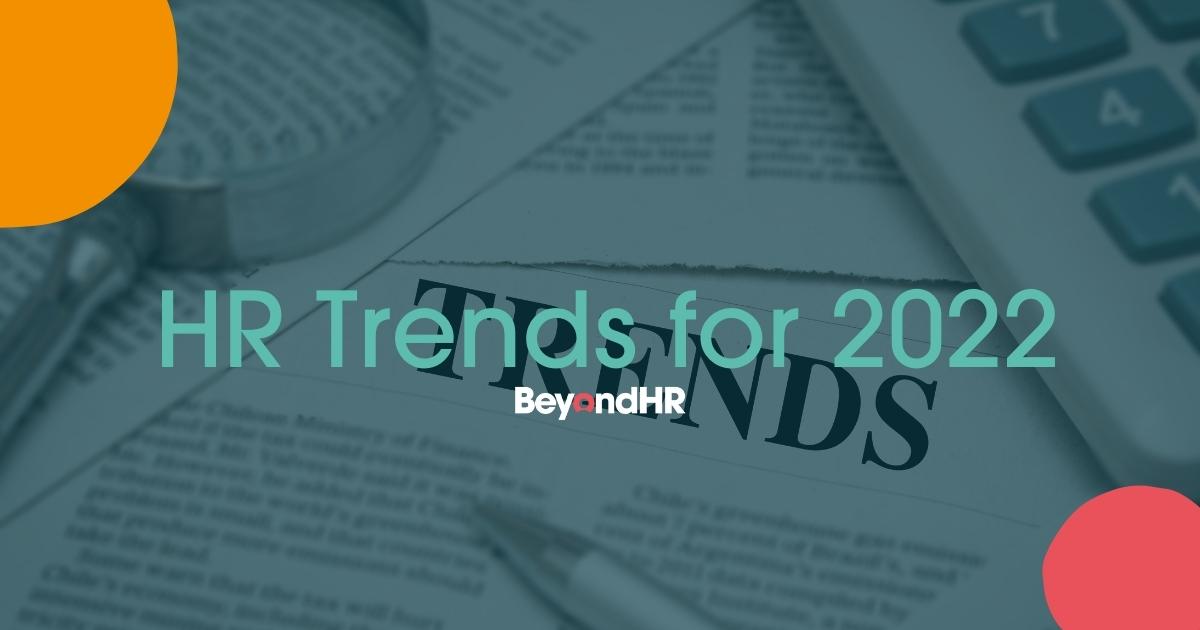Are you still living in 2020 and not quite sure where the last two years have gone? Is 2022 the year life becomes a bit more predictable again, potentially even those booked holidays will go ahead? While we aren’t certain PCR tests will be disappearing any time soon as we adapt into a new ‘normal’, we can be sure that the HR industry will see new and exciting trends in 2022.
Whilst staying up to date with employment law and statutory pay changes remains, we will also see new HR trends forming and others continuing. From the ‘great resignation’ still having an impact on businesses, to the increasing influence of artificial intelligence in admin tasks take the lead in HR management.
Check out our 5 HR trends for 2022:
1. Artificial intelligence
Digital transformation continues to storm the HR industry and the automation of administrative tasks will increase during 2022. This growth will allow HR managers to focus on more high impact tasks such as building more inclusive and diverse workplace cultures, instead of monotonous daily admin tasks.
At BeyondHR we are partner with Breathe HR to bring businesses HR management software designed to help to manage holidays, employee documentation and employee training. This allows managers and HR teams reduce their time managing administrative tasks for employees as well as helping to ensure efficient organisation of employee processes, including holiday cover and ensuring up to date training has been carried out by all personnel.
2. Increased focus on mental health support
Employees are less likely to stay within stressful environments due to the impact on their mental health and well-being. Company initiatives geared towards improving employee mental health and monitoring employee wellbeing, especially with WFH, are now essential. From open and regular communication between managers and co-workers. These conversations should not be only work related but personal.
Why do companies need to invest in employee well-being?
3 main reasons:
- Better employee engagement
- Increased employee performance
- Reduced sickness absence
When developing a mental health and wellbeing strategy, senior management should be fully engaged and liaise with all employees. Begin with reviewing the working environment and work demands – are these too high, adding unnecessary pressure to employees?
Social wellbeing within the company should be analysed, do employees have good working relationships or is there personal growth for employees helping to develop their careers? Companies can promote healthier lifestyle choices for their employees, furthermore, providing guidance on financial wellbeing should be a key aspect of any wellbeing strategy.
Our HR experts can provide support in monitoring a wellbeing strategy, establishing any potential information missing from the strategy.
3. The Great Resignation continues…
The great resignation continues in 2022, calling for greater company benefits and a greater need for transparency. People changing careers has soared by 50% globally in 2021 causing the biggest change in the recruitment market and skill shortages rising.
Company culture is playing a bigger role in recruitment, including how they manage employee wellbeing. Consideration should be given to companies’ online presence and employer brands, taking into consideration customer and former employees’ reviews. For example, candidates may search the company on Glassdoor which focuses on internal insights of a business.
What is your recruitment process, are you carrying interviews out by video call or face-to-face or both? Pre-pandemic 94% of final interviews were carried out face-to-face, post-pandemic this figure has dropped to 17%. Are you willing to adapt your interview process to be flexible if candidates ask for video call interview?
4. Increased flexibility and dealing with rising absence
The 4-day week is likely to increase in 2022, employees valuing their time more following the pandemic. Companies may be wise to contingency plan how they might manage multiple flexible working requests and the feasibility of adapting to a 4-day week.
In regard to absence management procedures, we have already seen a recent change in statutory sick pay certification processes. Employees across the UK can now self-certify sickness for 28 days instead of 7 days until January 2022. This means companies are unable to ask employees for medical proof of sickness until after 28 days.
Effective absence management can lower absenteeism however, business will need to take a balance approach due to the ongoing war for talent in recruitment.
5. HR collaboration
HR departments can improve internal processes more effectively through collaboration with other teams, particularly IT and finance.
IT departments can help to provide quicker and securer methods of gathering and storing essential employee information as well as making it simpler for employees to manage their own sickness absence and holiday requests. Furthermore, IT departments may have improved methods for completing work through online platforms, helping to decrease the workload of employee. This may result in a better working environment and reducing stress levels.
Collaboration with finance can help with budgeting for new updated platforms for workload management, as well as, helping to develop a strategy for financial wellbeing policy for employees. HR departments can hold training and guidance for employees for managing their work and personal budgets. This is becoming more and more relevant with the increased costs from Brexit.
As mentioned, IT departments can have quicker and easier methods for completing tasks, which has great relevancy for transport industry and businesses importing from UK/Europe. Business have increased red tape for importing and exporting following Brexit, leading to more paperwork and documentation required. HR and IT can work together to create process to minimise the impact and time required for additional red tape.
We cannot be certain what 2022 holds for us, but as always, we are available to support your business and teams with any HR issue that may arise. We are looking forward to working with you this year. Contact us at [email protected]





